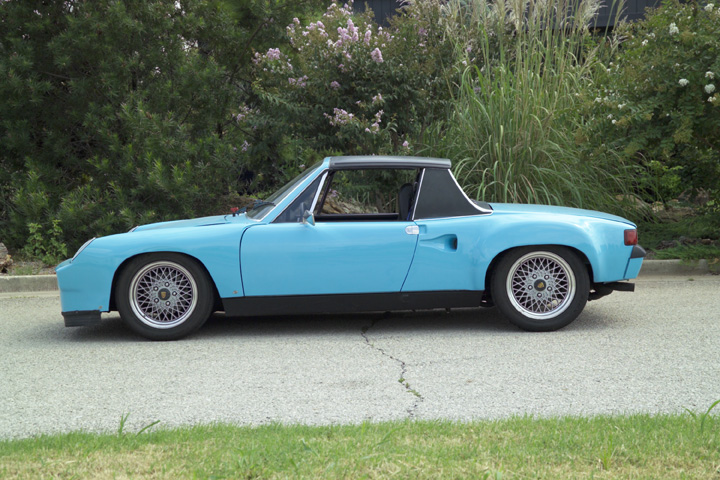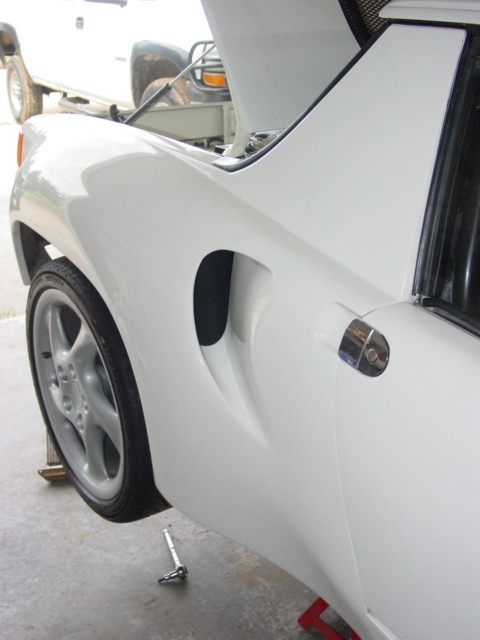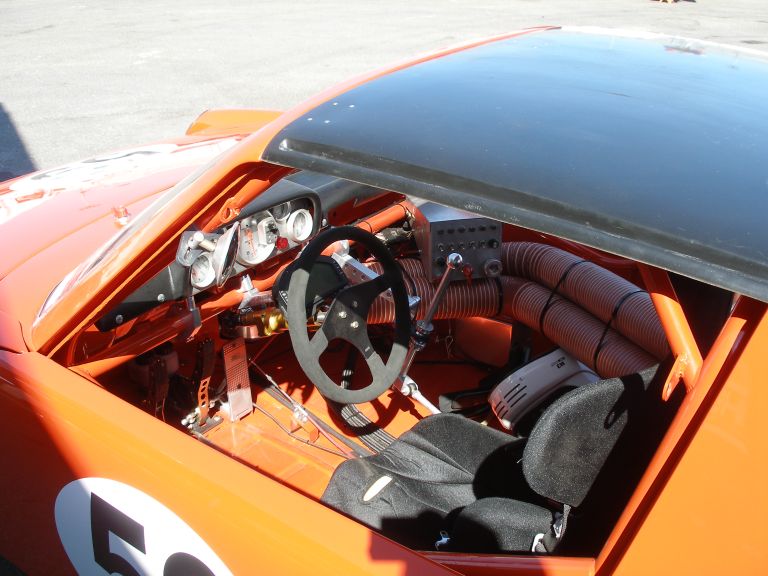|
|

|
Porsche, and the Porsche crest are registered trademarks of Dr. Ing. h.c. F. Porsche AG.
This site is not affiliated with Porsche in any way. Its only purpose is to provide an online forum for car enthusiasts. All other trademarks are property of their respective owners. |
|
|
  |
| ottox914 |
 Dec 4 2006, 01:43 PM Dec 4 2006, 01:43 PM
Post
#1
|
|
The glory that once was.    Group: Members Posts: 1,302 Joined: 15-December 03 From: Mahtomedi, MN Member No.: 1,438 Region Association: Upper MidWest  |
I seem to recall a topic on testing someone did with regards to airflow over the top of the engine grill, thru the grill into the engine area, and inside the engine area. Yes, I consulted Mr Search, but he and I are not on the same channel, as I just can't seem to find what I'm looking for. Anyone recall the thread, or have any info/experience to share on this topic?
|
| Dr. Roger |
 Dec 4 2006, 02:09 PM Dec 4 2006, 02:09 PM
Post
#2
|
|
A bat out of hell.     Group: Members Posts: 3,944 Joined: 31-January 05 From: Hercules, California Member No.: 3,533 Region Association: Northern California |
one of our memebers did a college project using taped yarn over the entire car. i forget who it was but i thought is was pretty bitchin'.
has has videos of yarn indicators while driving, and in a water tank using dye to view turbulence. someone will pop up with the answer. |
| john rogers |
 Dec 4 2006, 02:28 PM Dec 4 2006, 02:28 PM
Post
#3
|
|
Senior Member    Group: Members Posts: 1,525 Joined: 4-March 03 From: Chula Vista CA Member No.: 391 |
The cooling air for the engine is drawn from the top part of the engine tin/seal and is pulled downward through the engine grill. The hot air is blown out the bottom which is why it is important to keep the two sealed and seperate. Since the engine fan is drawing the air in the grill and the grill is right behind the sharply cut off roof line there tends to be a serious low pressure area right behind the rear window. That is one of the reasons racers either run a vent tube through the fire wall from the front, over the sail on the side or lift the roof slightly (as I did) to help get air into that area. At high speeds this low pressure can extend nearly to the rear of the trunk which is why you see larger spoilers on the rear deck lid of the race cars than the one normally called the "GT" spoiler as the smaller ones do not do a whole lot of good.
|
| SGB |
 Dec 4 2006, 03:07 PM Dec 4 2006, 03:07 PM
Post
#4
|
|
just visiting     Group: Members Posts: 4,086 Joined: 8-March 03 From: Huntsville, AL Member No.: 404 Region Association: South East States |
Just wondering...
Has anyone ever cut a scoop/vent thing IN the sail panel to force air into that low pressure area? |
| ottox914 |
 Dec 4 2006, 04:04 PM Dec 4 2006, 04:04 PM
Post
#5
|
|
The glory that once was.    Group: Members Posts: 1,302 Joined: 15-December 03 From: Mahtomedi, MN Member No.: 1,438 Region Association: Upper MidWest  |
So John, if I'm reading you right, the area from behind the rear window, extending over the engine lid, and at speed, as far back as the back of the rear trunk, is low pressure, meaning the tendency would be for air to move FROM this are upward? Or is this low pressure in the case of the air being more stagnent, and avalible for the motor to use to cool. Does running the car topless create more turbulence and make a difference?
Thinking this thru with my limited grey matter, (not grey hair) the engine fan then needs to produce an even lower pressure area in front of the fan to cause air to enter and cool the engine, or does the engine fan actually "push" air over the engine? If the low pressure area behind the back window is lower by the glass, and not quite as low by the latch (rear trunk end of the engine lid), where would I want to put a small fan, and would I want a pusher or puller? Would a pusher, mounted closer to the latch, pull some heat out of the engine compartment, and make a lower low pressure area at the front of the engine compartment, by the engine fan, and therefore make the fan more effective? How about some ducting to separate the pusher by the latch, and the low pressure area by the back glass? Maybe I'm thinking to much, but I recall in high school science, we didn't "suck" a coke or thick shake thru the straw, we created a low pressure area inside our mouth and the air pressure around the cup "pushed" in the soda/shake. We just needed lower pressure for the shake as it was thicker and needed a bigger push. |
| GTPatrick |
 Dec 4 2006, 04:29 PM Dec 4 2006, 04:29 PM
Post
#6
|
|
Member   Group: Members Posts: 245 Joined: 8-September 05 From: Memphis, Tn. Member No.: 4,768 Region Association: None |
There was a posting/thread back in '05 or '04 talking about this very same idea. The dude who started it broached some ideas about either venting air from underneath the car thru some vent tubes up the backside of the firewall to cool the engines. and them some sort of louvered grill or open screen in the valance panel to let it exit out.
Also didn't someone talk about putting some panels in the lower part of the engine compartment to not only seal it off but help in directing airflow into and/or around the engine compartment ? The main idea may have been to reduce drag and induce better cooling airflow for the engine . Also , what about venting some air from the lh or rh quarter panel just behind the firewall thru an air scoop or a naca duct ? Fiero owners use this idea for a ram air effect into the efi carb and also allow better airflow cooling of the engine compartment. Hey , it's worth a thought . Ciao for now. GTP |
| john rogers |
 Dec 4 2006, 05:05 PM Dec 4 2006, 05:05 PM
Post
#7
|
|
Senior Member    Group: Members Posts: 1,525 Joined: 4-March 03 From: Chula Vista CA Member No.: 391 |
Well, my mentor tells me that the fan for the engine is actually not needed or at a minumum of 4 blades which he used to use when he was racing 1.7L 914s back in the SCCA days. The hot setup was to duct air from the front of the car, through the front bulkhead and through the firewall with a pair of those aluminum dryer flex hoses. The engine could not sit at idle for very long or it would over heat badly. He also noted that all the engine tin was usually used, especially around the barrels to help with cooling. I think the fans, no matter what type I.E. stock, DTM or 911 type all push the air over the engine and put the bottom. There are supposed to be two flaps at the bottom of the firewall that will cause turbulance and help the hot air to escape better. With the top off and the windows down (as you must have when racing) the rear window will catch some of the air spilling over the windshield and act as an air brake which is why you usually see either top on with the windshield or like Brant's, not top at all.
|
| Dave_Darling |
 Dec 4 2006, 09:18 PM Dec 4 2006, 09:18 PM
Post
#8
|
|
914 Idiot                Group: Members Posts: 15,051 Joined: 9-January 03 From: Silicon Valley / Kailua-Kona Member No.: 121 Region Association: Northern California 
|
I've seen photos of tuft testing that show air flowing forward along the rear decklid into the engine bay. Weird stuff, but then again fluid dynamics is sure weird anyway!
There is something of a low-pressure area over the engine lid. I don't know what it's caused by--could even be the cooling fan for all I know! But the air moves from the rear of the car toward the engine lid along the top of the rear decklid. A few inches up from the deck, flow is from front to aft. The engine isn't exactly drawing from a high-pressure area, but the real key is that it is (hopefully!) venting into a lower-pressure area. Which is one thing that the flaps under the car are supposed to help with, if I understand correctly. BTW, the "almost no fan needed" is really only valid for a race car that is almost never sitting still. Because most of the cooling is from the ram-air effect. You can search for "sewer pipe" and find more pics. Traditionally the cylinder upper and lower tins are used, but the upper ones are trimmed so they don't go all the way to the engine shelf. The rest of the tin is omitted, as it is (at that point) unneeded weight. Demick has done some tests of bringing cool air into the EFI's intake snorkel; he said that it made a noticeable difference on his car. I wouldn't be surprised to see a difference if you bring cooler air into the engine cooling fan as well. --DD |
| SirAndy |
 Dec 4 2006, 10:00 PM Dec 4 2006, 10:00 PM
Post
#9
|
|
Resident German                          Group: Admin Posts: 41,854 Joined: 21-January 03 From: Oakland, Kalifornia Member No.: 179 Region Association: Northern California |
Has anyone ever cut a scoop/vent thing IN the sail panel to force air into that low pressure area? you mean, like cutting a huge hole in the only part that keeps your head attached to your body in case of a rollover? (IMG:style_emoticons/default/confused24.gif) Andy |
| ChrisFoley |
 Dec 5 2006, 06:29 AM Dec 5 2006, 06:29 AM
Post
#10
|
|
I am Tangerine Racing      Group: Members Posts: 7,962 Joined: 29-January 03 From: Bolton, CT Member No.: 209 Region Association: None 
|
|
| PinetreePorsche |
 Dec 5 2006, 08:21 AM Dec 5 2006, 08:21 AM
Post
#11
|
|
Member   Group: Members Posts: 235 Joined: 14-November 05 From: Falls Church, VA Member No.: 5,124 |
Scoops on the outside of the sail panels?--sounds like a description of the intakes on a 904 (which came in big and half-size--check out pics at 904 store and elsewhere). But I'm told that those scoops were routed to cool the r. brakes. Can anyone verify this? -Chris, in DC 'burbs
|
| SGB |
 Dec 5 2006, 08:46 AM Dec 5 2006, 08:46 AM
Post
#12
|
|
just visiting     Group: Members Posts: 4,086 Joined: 8-March 03 From: Huntsville, AL Member No.: 404 Region Association: South East States |
Has anyone ever cut a scoop/vent thing IN the sail panel to force air into that low pressure area? you mean, like cutting a huge hole in the only part that keeps your head attached to your body in case of a rollover? (IMG:style_emoticons/default/confused24.gif) Andy Yeah, y'know a series of holes lined up like the perforated top of a cereal box so you could just rip it off by hand! (IMG:style_emoticons/default/smile.gif) Well, maybe just just a cup sized thing somewhere along the panel... edit: like that 904, but It looks like Chris's research refutes that location.... |
| race914 |
 Dec 5 2006, 09:08 AM Dec 5 2006, 09:08 AM
Post
#13
|
|
73 914-4    Group: Members Posts: 1,006 Joined: 31-October 05 From: Nipomo, California (Central Coast) Member No.: 5,027 Region Association: Central California |
A pic from Rough Rider in a recent thread on rear fender vents
 |
| race914 |
 Dec 5 2006, 09:12 AM Dec 5 2006, 09:12 AM
Post
#14
|
|
73 914-4    Group: Members Posts: 1,006 Joined: 31-October 05 From: Nipomo, California (Central Coast) Member No.: 5,027 Region Association: Central California |
Another one
 |
| race914 |
 Dec 5 2006, 09:19 AM Dec 5 2006, 09:19 AM
Post
#15
|
|
73 914-4    Group: Members Posts: 1,006 Joined: 31-October 05 From: Nipomo, California (Central Coast) Member No.: 5,027 Region Association: Central California |
The hot setup was to duct air from the front of the car, through the front bulkhead and through the firewall with a pair of those aluminum dryer flex hoses. This is a topic near & dear to my heart and I've been collecting info, pics, etc. Here's another approach that John mentioned. Pic of Frank Beck's car  |
| race914 |
 Dec 5 2006, 09:34 AM Dec 5 2006, 09:34 AM
Post
#16
|
|
73 914-4    Group: Members Posts: 1,006 Joined: 31-October 05 From: Nipomo, California (Central Coast) Member No.: 5,027 Region Association: Central California |
one of our memebers did a college project using taped yarn over the entire car. i forget who it was but i thought is was pretty bitchin'. has has videos of yarn indicators while driving, and in a water tank using dye to view turbulence. someone will pop up with the answer. Here is the 'yarn' video, etc. from Chris914 http://www.cassidy-online.com/porsche914/a...aids/index.html |
| Bewildebeest |
 Dec 5 2006, 01:21 PM Dec 5 2006, 01:21 PM
Post
#17
|
|
Newbie  Group: Members Posts: 4 Joined: 20-November 06 From: Northamptonshire, England Member No.: 7,237 |
I've seen photos of tuft testing that show air flowing forward along the rear decklid into the engine bay. Weird stuff, but then again fluid dynamics is sure weird anyway! There is something of a low-pressure area over the engine lid..... (IMG:http://i14.tinypic.com/3355cu9.jpg) If you don't mind a Limey chipping in....from what I remember at school the low pressure area - the red bit - behind the back window and above the grill is caused by the forward motion of the car. The air then drops down and rolls around in a vortex to fill the low pressure area hence the forward flowing tufts in the video. At some point towards the back of the car - the blue area - the air then starts to flow backwards again - where exactly depends on the cars speed - hence the unstable flow of the tufts at this point. Hey you guys invented the aeroplane - you should remember this ! It does seem odd though that Mr Porsche put a low pressure area just where the carbs and the fan are trying to suck in air. Perhaps at 'low' speeds it's not significant. |
| maf914 |
 Dec 5 2006, 02:15 PM Dec 5 2006, 02:15 PM
Post
#18
|
|
Not a Guru!     Group: Members Posts: 3,049 Joined: 30-April 03 From: Central Florida Member No.: 632 Region Association: None 
|
Hey you guys invented the aeroplane - you should remember this ! I don't think the wing sections used by the Wright brothers were shaped like a 914 roof! (IMG:style_emoticons/default/laugh.gif) It's interesting that Porsche began using a roof configuration similar to that used on the 914, cut-off roof with flying butresses, in the mid-sixties with the 910 racing car. Similar shapes were used on the 907 and 908 short tail coupes. (IMG:style_emoticons/default/idea.gif) |
  |
1 User(s) are reading this topic (1 Guests and 0 Anonymous Users)
0 Members:

|
Lo-Fi Version | Time is now: 31st October 2024 - 05:27 PM |
Invision Power Board
v9.1.4 © 2024 IPS, Inc.








